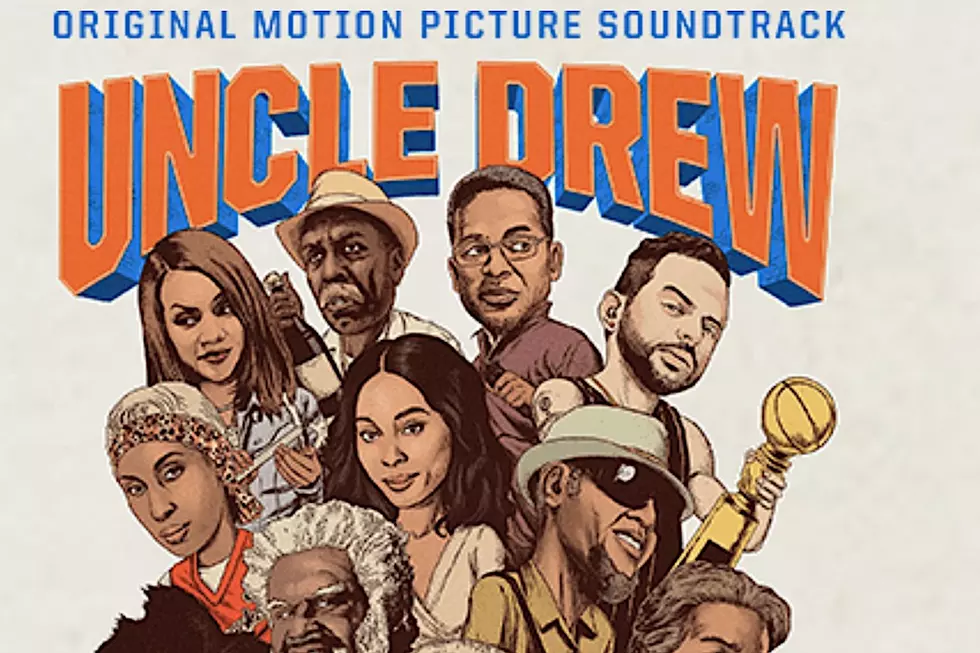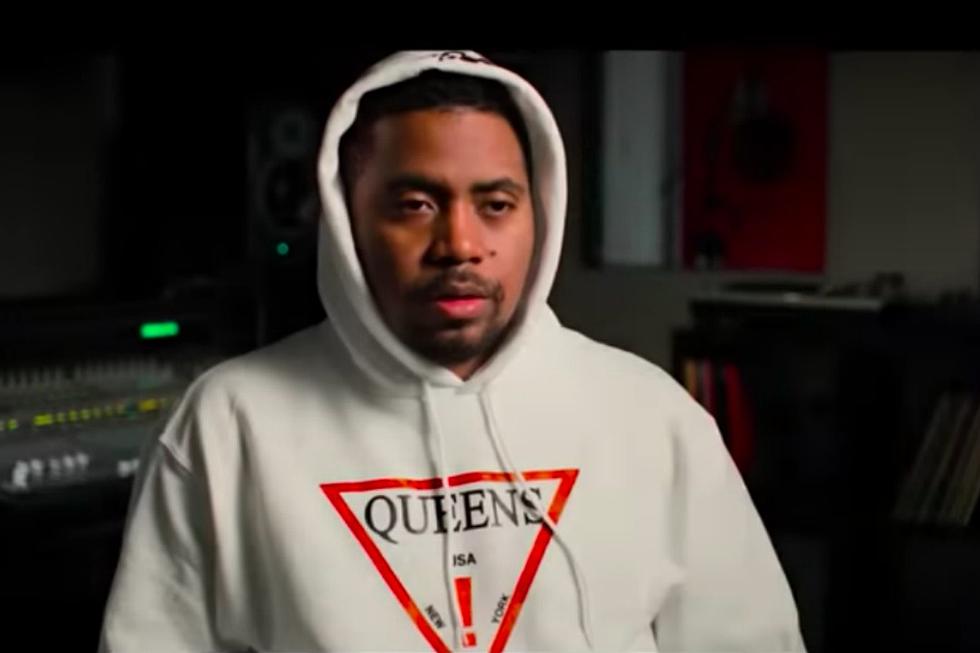
G-Eazy Talks Hyphy Beginnings, Hot Fans and ‘Must Be Nice’ Album
G-Eazy has had his fair share of coffee-fueled studio sessions. The 23-year-old has a habit of dimming the lights in his shotgun house and tweaking his beats and lyrics to perfection.
"I know my neighbors hate me," he tells The BoomBox with a laugh. "The walls in those houses are mighty thin and they just bang on those walls. I'm just like, 'Fuck it.'"
The Oakland native knew this would be his path as a youngster. He chose a rap alias at 13 and patiently waited for the opportunity to share his music with the world. This is his time now, and the rapper-producer is finally seeing the fruit of his labor.
As an independent artist, his third official project, Must Be Nice, peaked at No. 4 on the iTunes Hip-Hop charts after a late September release. He's been on the road for the better part of 2012, promoting songs off the effort. Must Be Nice, full of promise and a young man's bravado, is proof of his grind.
The BoomBox spoke with the rising rhymer about his LP, craziest tour moment, hyphy beginnings and the perks of fame.
How has the tour with Hoodie Allen been for you?
It's been good. It's been exciting. I like to be on the road, you know. Whenever I'm at home, I always think of how bad I miss tour so as soon as we finished the Vans Warped Tour, I was like, 'Man I can't wait to get back out.' But really I'm looking forward to what's coming next. I'm doing my first headlining tour so it's like entering into a new chapter. For me as an artist, that's what I'm really excited about.
Define the ways you've grown since your beginnings in 2008.
I've definitely grown and evolved as a person, as an artist, you know. Just in terms of my style, my taste, my influences, everything... That's a part of being an artist I think. I feel like if you're stuck doing the same thing your whole career you've got to be doing something wrong. Unless you're getting great results from it or you're just comfortable in that spot. I think you should always push yourself to want to grow and learn more and be inspired and develop. It's just a process of where I've been and what I've been surrounded by. I've experienced a lot. I've been to a lot of places and it's been an exciting run.
So you're originally from Oakland and you actually have a personal connection to the hyphy movement out there, but your music sounds nothing...
Nothing like that! Yeah.
What was it that pushed you to go outside of what's expected from an Oakland artist so closely aligned with hyphy?
Well, I mean, it's just a changing process. When I was in high school, that's all I was around. And that was everything to me. We had a ton of pride being from the Bay and hearing our music on the radio and getting that national attention. When [E-40's] "Tell Me When to Go" came out and they played it on [BET's] "106 and Park" We were like, "Yo! That's us!" That was our shining moment! So there was a lot of pride in being from the Bay and that never left me.
I'm still every bit as much from there and a part of that as ever. It's just that my music has grown, my taste has changed and hyphy just really isn't me at the chapter that I'm in in my life. But if you listen closely, you can still hear the influence here and there because that's where I got my start. But it's like anything else. If you look at any creative person's work, you can see bits and pieces of their influences. That's what an artist does. They're inspired and influenced by different people's styles and when you mix all that together, it looks exactly like their work.
Did your family initially support your decision to become a rapper? You knew that you wanted to do this at a pretty young age.
Nah, not right away. I mean, my moms has always been my homie. I don't ever want to say anything to disrespect her or anything like that because she's always been down. But when I was in high school and I was telling her like, 'Nah, I'm not gonna go to college. I'm just gonna chill in the Bay and become a rapper.' She was not having it, you know what I'm saying. She was really the one that was like, "No. You gotta bust your ass and go out there and look at these schools. You gotta look for these scholarships and you gotta actually go get that degree." And in hindsight, I'm glad she did because it took me leaving the Bay to broaden my horizons and learn more about the world. Going to [Loyola University in] New Orleans and soaking up everything down there. She's definitely super proud of me and she's one of my biggest fans now too.
And you're still down there in New Orleans. Does being a resident of that city influence your music at all?
The biggest thing about New Orleans that hit me right off the bat was how big of a scene there is there for live music. Every night of the week there are bands playing... And what's really big out there are the brass bands. The thing about going to see a brass band play is that they really know how to put on a show and they know how to control a crowd, you know. I would watch that as a rapper and be like, "Man, rap shows are kinda weak..." Look at these guys up here killing it, totally commanding the crowd and I was like, "How can I make my show a show? And really learn how to perform and move a crowd?" I just went out there and experienced a bunch of people play live, that side of music, knowing that there's more than just MySpace plays -- at that time in high school -- or getting on the radio and selling CDs. There's the whole side of polishing your live show and turning it into an experience.
Some say that Must Be Nice is your seventh full-length project. Is that right?
Eh. It depends on how you're counting, because I would call it my third to be honest. I'd say The Outsider, Endless Summer and Must Be Nice. Everything before Must Be Nice, I would consider practice but I'll be generous and include those two from before.
In a trailer for the album, you sat there with a French press in a dark room making music on your desktop. It spoke to your dedication.
That's me! I wake up, make some coffee and I just sit there all day and just vibe.
Why title the new project Must Be Nice?
To be completely honest, I had about 75 to 80 percent of the music done and I didn't have a name for the album. I was scrambling. I had a couple of ideas but they were all weak. So I was like, "Yo, what am I gonna call this album? The deadline's coming and I gotta think of something."
I was on the Warped Tour and I was chilling on the bus, smoked out with a couple of friends and we were talking about the album. I was telling them that I didn't know what to call it. This one kid, Stoney Steve, was asking me what the album was about and I told him that it's a snapshot of where I am at this point in my life. The parties and the shows are getting bigger, the girls are getting prettier, everything is getting crazier. It's like a roller coaster but at the same time, I'm not there yet. It's like I'm looking through the glass at what this is gonna turn into. And he was just like, "Must be nice." And it just clicked like, 'Yo. That's it! No discussion.' I never even had another discussion about it.
Which track means the most to you and why?
Either "Plastic Dreams" or the title track. Because "Must Be Nice" is the explanation. I've been hungry for this for so long. I've worked for a long time, you know. And it's like, that's how I feel. It must be nice to get there and see it actually start to materialize. It's beautiful. Recording that track was the best experience because it was the last one -- literally the day before I left for tour. I was right up to the deadline when I had to turn in the album and we're leaving for tour so I had to get it done. I told everyone to leave and I was in the house by myself, drinking my whiskey and I just zoned out, wrote and recorded it right there. Right on the spot and it felt so natural, so genuine when I did it and it was just what it needed to be.
For those who aren't familiar with you, could you break down your musical influences?
My influences aren't necessarily from this time period. I always say John Lennon and the Beatles. Bob Marley, Nirvana, Tupac, Biggie, Nas... I just try and look at the greats to see what stories they told and what perspective they had on things and how they were able to connect with so many people. Kurt Cobain and Bob Marley said this, that they would try to write their songs almost like kids' songs. Just as simple as possible so that they could reach everybody. So that they could be accessible and people would listen to their stories and that's what I wanted to do with music is to make something that was universally accessible, that people can appreciate and identify with.
You've been touring for much of 2012. What's been the craziest experience while on the road?
Man, there are so many... We would do meet and greets every day on the Warped Tour. Most days it'd be really hot. I'm standing there sweating. Kids are standing there with the sun beating down and they're waiting in the meet and greet line for like an hour. This girl passes out in the line. They pull her under our tent and give her water. She wakes up and runs right back in the line [laughs]. It was wild! I didn't know what else to say other than, "That's love! I appreciate that."
%VIRTUAL-MultiGallery-163137|164536|167170%
More From TheBoombox

![T.I. Says Today’s Rappers Believe Dissing Older Artists Will Earn Them Respect [VIDEO]](http://townsquare.media/site/625/files/2018/03/T-I-Rapture-Netflix.jpg?w=980&q=75)



![G-Eazy Battles His Demons On ‘The Beautiful & Damned’ [LISTEN]](http://townsquare.media/site/625/files/2017/11/G-Eazy.png?w=980&q=75)
![Cassie Is in a Dysfunctional Relationship in ‘Love a Loser’ Video [WATCH]](http://townsquare.media/site/625/files/2017/10/Cassie-Love-A-Loser.jpg?w=980&q=75)
![G-Eazy and Cardi B Perform ‘No Limit’ on ‘Tonight Show’ [WATCH]](http://townsquare.media/site/625/files/2017/09/g-eazy-cardi-b.jpg?w=980&q=75)
![G-Eazy Enlists A$AP Rocky and Cardi B for Boastful Track ‘No Limit’ [LISTEN]](http://townsquare.media/site/625/files/2017/09/G-Eazy-No-Limit-ASAP-Rocky-Cardi-B.jpg?w=980&q=75)
